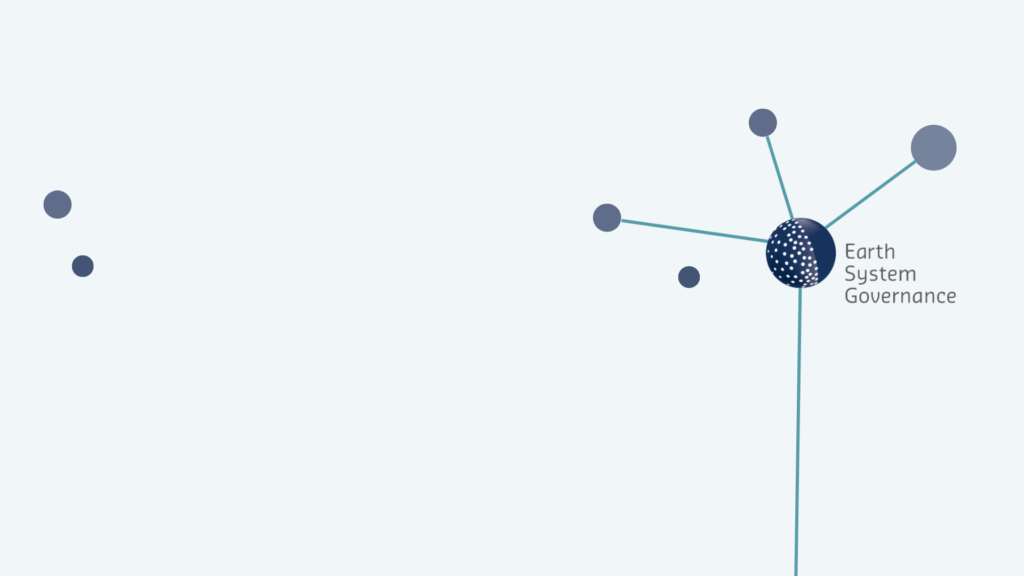The working group on ‘Environmental Policy Integration’ within the Taskforce on Conceptual Foundations in Earth System Governance focused on the concept ‘Environmental Policy Integration’ (EPI). The concept of EPI refers to the process of integrating environmental objectives into non-environmental policy areas, such as energy, agriculture and transport, rather than leaving them to be pursued solely through purely environmental policy practices. EPI is widely recognised as one of the key elements of sustainable development. More recently, the notion of ‘climate policy integration’, also denoted as ‘mainstreaming’, has been applied to indicate the integration of climate considerations (both mitigation and adaptation) into the normal (often economically focused) activity of government.
The working group was active from 2015-2018. Its aims were to explore:
- the origins of the concept and the initial ideas behind the concept, as well as how this differs in time, in place, and between policy sectors;
- its adoption and diffusion, in time, in place, at different levels and between different policy sectors (a specific issue is what groups have played a critical role in its development and propagation);
- how the concept has been employed in political argument;
- its influence on policy or the processes or structures of environmental governance (and how this has changed over time and between policy sectors; is it still alive, or has it gradually disappeared in policy practice?);
- its impacts in terms of raising environmental awareness and its contribution to environmental protection;
- whether real-life experiences with environmental policy integration have led to a strengthening or a weakening of environmental policy, and what seems to work better – organising environmental policy as a silo, or by means of EPI;
- the prospects of EPI and mainstreaming – will they endure, what is their potential, will they be replaced by other concepts.
We were particularly interested in pushing our knowledge about the impacts of EPI further – the literature does not provide an adequate answer to the question of what EPI strategies work, where and why (Runhaar et al., 2014). Therefore we aimed at requires bringing together empirical studies that have been conducted on EPI (in different countries, policy levels, and policy sectors) and additional international comparative empirical research.
Initiators of the working group were Prof. Hens Runhaar, Prof. Peter Driessen, Prof. Christine Wamsler and Prof. James Meadowcroft. For more information please contact Hens Runhaar: h.a.c.runhaar@uu.nl
Activities
After the kick-off seminar of the working group on EPI on 1-2 October 2015 (see Report), Sylvia Karlsson-Vinkhuyzen and Åsa Persson organised a Section on EPI during the ECPR General Conference, held 7-10 September in Prague. A report of our section including the various panels that are grouped under that Section (S18) can be found here [pdf].
A third activity was the development of a Special Issue in Environmental Science & Policy on Environmental Policy Integration: Taking stock of policy practice in different contexts, edited by Åsa Persson and Hens Runhaar (acting as lead editors) and Sylvia Karlsson-Vinkhuyzen, Gerard Mullally, Duncan Russel and Alexander Widmer. In this Special Issue, EPI was studied from different angles and in different countries, at multiple levels and in various sectors. It resulted in a theoretical framework of the factors affecting progress in EPI.
Fourth, two systematic literature reviews were conducted in order to bring together empirical, peer-reviewed studies on EPI and on climate adaptation mainstreaming (a specific form of EPI) in order to assess the achievements of this strategy and identify the key factors affecting EPI. This resulted in two publications:
- Runhaar, H., B. Wilk, Å. Persson, C. Uittenbroek and Wamsler (2018), Mainstreaming climate adaptation: taking stock about ‘what works’ from empirical research worldwide, Regional Environmental Change, 18 (4), pp. 1201-1210.
- Hens Runhaar, Bettina Wilk, Peter Driessen, Niall Dunphy, Åsa Persson, James Meadowcroft and Gerard Mullally (2019), Policy Integration, in Biermann, Frank; Kim, Rakhyun E. (eds.): Global Governance for the Earth: Transforming Institutional Architectures in the Anthropocene, to be published with Cambridge University Press.
After these activities and outputs we have come to the conclusion that now it is time to move on. We considered the working group as a temporary initiative, with the main aims of bringing together both scholars and scientific insights regarding EPI. The above publications provide good state-of-the-art overviews which hopefully will inspire other researchers.
Relevant articles
Adelle, C. & Russel D. (2013). Climate Policy Integration: a case of déjà vu? Environmental Policy and Governance.
Bauer, A. & Steurer, R. (2014). National Adaptation Strategies, what else? Comparing adaptation mainstreaming in German and Dutch water management. Regional Environmental Change (article in press).
Jordan, A. & Lenschow, A. (2010). Environmental policy integration: a state of the art review. Environmental Policy and Governance.
Kivimaa, P. & Mickwitz, P. (2006). The challenge of greening technologies: environmental policy integration in Finnish technology policies. Research Policy.
Lafferty, W. M. & Hovden, E. (2003). Environmental policy integration: towards an analytical framework. Environmental Politics.
Mullally, G. and N. Dunphy (2015). State of play review of Environmental Policy Integration literature, a report for the National Economic and Social Council, University College Cork: Cork.
Nilsson, M. & Eckerberg, K. (eds). (2009). Environmental Policy Integration in Practice Shaping Institutions for Learning. Earthscan Publications: London.
Nilsson, M. & Persson, Å. (2003). Framework for analysing environmental policy integration. Journal of Environmental Policy and Planning.
Persson, Å. (2004). Environmental policy integration: an introduction. Stockholm Environment Institute.
Runhaar, H., Driessen, P.P.J. & Soer, L. (2009). Sustainable urban development and the challenge of policy integration. An assessment of planning tools for integrating spatial and environmental planning in the Netherlands. Environment and Planning.
Runhaar, H., Driessen, P.J.J. & Uittenbroek, C. (2014). Towards a systematic framework for the analysis of Environmental Policy Integration. Environmental Policy and Governance.
Runhaar, Hens, Bettina Wilk, Åsa Persson, Caroline Uittenbroek, Christine Wamsler. (2017). Mainstreaming Climate Adaptation: Taking Stock about “What Works” from Empirical Research Worldwide. Regional Environmental Change.
Solorio, I. (2011). Bridging the gap between environmental policy integration and the EU’s energy policy: mapping out the ‘green Europeanisation’ of energy governance. Journal of Contemporary European Research.
Söderberg, C. (2011). Institutional conditions for multi-sector environmental policy integration in Swedish bioenergy policy, Environmental Politics.
Uittenbroek, C.J., Janssen-Jansen, L.B. & Runhaar, H.A.C. (2013). Mainstreaming climate adaptation into urban planning: overcoming barriers, seizing opportunities and evaluating the results in two Dutch case studies. Regional Environmental Change.
Wamsler, C. (2015). Mainstreaming Ecosystem-based Adaptation: Transformation Toward Sustainability in Urban Governance and Planning. Ecology and Society 20(2):30.
Wejs, A. (2014). Integrating climate change into governance at the municipal scale: an institutional perspective on practices in Denmark. Environment and Planning C: Government and Policy (in press).
Further links
- Environmental policy integration in EU policies
- EU EPIGOV programme/website


